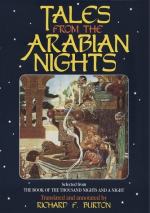I have already stated my conviction that there are two and only two ways of translating Arabic poetry into English. One is to represent it by good heroic or lyric verse as did Sir William Jones; the other is to render it after French fashion, by measured and balanced Prose, the little sister of Poetry. It is thus and thus only that we can preserve the peculiar cachet of the original. This old world Oriental song is spirit-stirring as a “blast of that dread horn,” albeit the words be thin. It is heady as the “Golden Wine” of Libanus, to the tongue water and brandy to the brain—the clean contrary of our nineteenth century effusions. Technically speaking, it can be vehicled only by the verse of the old English ballad or by the prose of the Book of Job. And Badawi poetry is a perfect expositor of Badawi life, especially in the good and gladsome old Pagan days ere Al-Islam, like the creed which it abolished, overcast the minds of men with its dull grey pall of realistic superstition. They combined to form a marvellous picture—those contrasts of splendour and squalor amongst the sons of the sand. Under airs pure as aether, golden and ultramarine above and melting over the horizon into a diaphanous green which suggested a resection of Kaf, that unseen mountain-wall of emerald, the so-called Desert, changed face twice a year; now brown and dry as summer-dust; then green as Hope, beautified with infinite verdure and broad sheetings of rain-water. The vernal and autumnal shiftings of camp, disruptions of homesteads and partings of kith and kin, friends and lovers, made the life many-sided as it was vigorous and noble, the outcome of hardy frames, strong minds and spirits breathing the very essence of liberty and independence. The day began with the dawn-drink, “generous wine bought with shining ore,” poured into the crystal goblet from the leather bottle swinging before the cooling breeze. The rest was spent in the practice of weapons, in the favourite arrow game known as Al-Maysar, gambling which at least had the merit of feeding the poor; in racing for which the Badawin had a mania, and in the chase, the foray and the fray which formed the serious business of his life. And how picturesque the hunting scenes; the greyhound, like the mare, of purest blood; the falcon cast at francolin and coney; the gazelle standing at gaze; the desert ass scudding over the ground-waves; the wild cows or bovine antelopes browsing with their calves and the ostrich-chickens flocking round the parent bird! The Musamarah or night-talk round the camp-fire was enlivened by the lute-girl and the glee-man, whom the austere Prophet described as “roving distraught in every vale” and whose motto in Horatian vein was, “To day we shall drink, to-morrow be sober, wine this day, that day work.” Regularly once a year, during the three peaceful months when war and even blood revenge were held sacrilegious, the tribes met at Ukadh (Ocaz) and other fairsteads, where they held high festival and the bards strave




